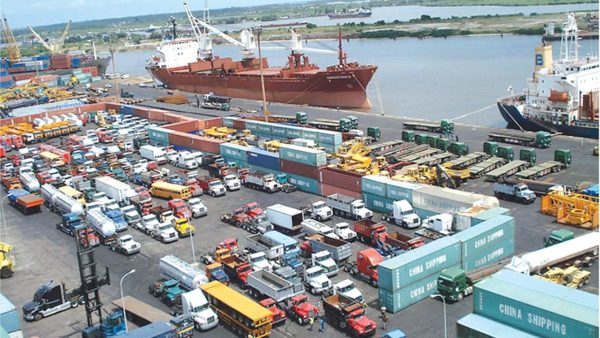It is estimated that 70 percent of over the 10 million illegal weapons in circulation in West Africa are in Nigeria. In this light, the recent directive by President Muhammadu Buhari to reintroduce the Cargo Tracking Notes (CTN) at Nigerian ports may be regarded as a masterstroke.
Buhari directed the Nigerian Shippers’ Council (NSC) to reintroduce Cargo Tracking Notes (CTN) in a bid to curb the proliferation of arms and increase in banditry across the nation.
- Police headquarters on fire, prisoners released as gunmen stage multiple attacks in Imo
- Fresh rumble as Kano anti-graft agency probes Emir Bayero
The government is convinced that CTN could play a crucial role in enabling the nation to address the growing spate of banditry, kidnappings and restiveness fuelled by easy access to guns.
CTN or the ECTN (Electronic Cargo Tracking Note), is a system for collecting documents and processing information, when exporting by sea in order to obtain prior information, to participate in security measures, statistics, and generally in order to participate in the World Trade Organisation (WTO) and the World Customs Organisation (WCO) recommendations on trade facilitation and security.
In Customs operations, activities of under-declaration false declaration, which leads to loss of revenue would also be curtailed with the reintroduction of CTN at the ports.
Although the Nigeria Customs Service (NCS) has made giant strides in recent years in terms of revenue collection, CTN also represents a new development to eliminate loopholes in port operations as cases of false declaration and under-declaration will become history.
While efforts to get the data on false declaration and under declaration from top Customs Area Commands like Tin Can Island Port and Apapa Port were futile as of press time, findings show that the need for 100% physical examination and numerous interceptions by different Customs units is a result of non-compliance by freight agents and importers.
This could be reduced with CTN and Customs could channel its efforts to more productive aspects of trade facilitation, revenue generation and anti-smuggling.
In 2017 alone, 2,671 pump-action rifles were intercepted at Nigerian seaports. The guns were legally registered for export in Turkey as pump-action rifles for hunting but the manifests were changed in Morocco to become steel doors to enable the container to gain entry into Nigeria.
With CTN, however, Nigeria would have been able to see the original manifests from Turkey and intercept the guns before the consignments arrived in Nigeria.
To eliminate the fears of port users that the new platform will increase the cost of doing business at the ports, Nigerian Shippers’ Council (NSC) has been encouraged to introduce the system in a way that shouldn’t add to the cost of doing business at the ports.
Twenty-four African countries currently use CTN, some of which are Nigeria’s neighbours like Benin Republic, Burkina Faso, Cameroon, Chad, Ghana and Togo.
Responding to these concerns, the Comptroller-General of NCS, Col Hammed Ali (Rtd) had threatened to jail and sack officers found to be involved in fraudulent practices in December 2020.
With CTN, however, the Customs Service will be under less criticism on valuation, interception of cargoes already released by its officers at the ports, even as the Service could reach new revenue feats.
Some analysts posit that it is surprising that despite surpassing its targets, the Customs seized goods, which Duty Paid Value (DPV) was put at close to N100 billion in 2020, another misnomer that could be addressed with CTN.
While most seaports across the country as well as the Federal Operations Unit (FOU) are an eye-sore of the fraud in the system where hundreds of billions of goods are seized and detained, the reality is that the current port system has failed and a new approach with CTN should be a welcomed development.
Although CTN has had two stints at Nigerian ports previously, under the administration of Nigerian Ports Authority (NPA) and later NSC, Nigeria would have to prequalify the possible companies via a bidding process.
The Executive Secretary, NSC, Mr. Hassan Bello, whose Council is to handle CTN describes it as “another instrument that will add value tremendously in shipping development”.
“It will boost the revenue of the government in customs revenue collection in the sense that it will abate under-declaration and concealment. It will boost the revenue of NPA because there will be no more alteration of the manifests.
“It will boost the revenue of NIMASA because under-declaration of the weight of ships will not be there any longer,” said Bello.

 Join Daily Trust WhatsApp Community For Quick Access To News and Happenings Around You.
Join Daily Trust WhatsApp Community For Quick Access To News and Happenings Around You.


